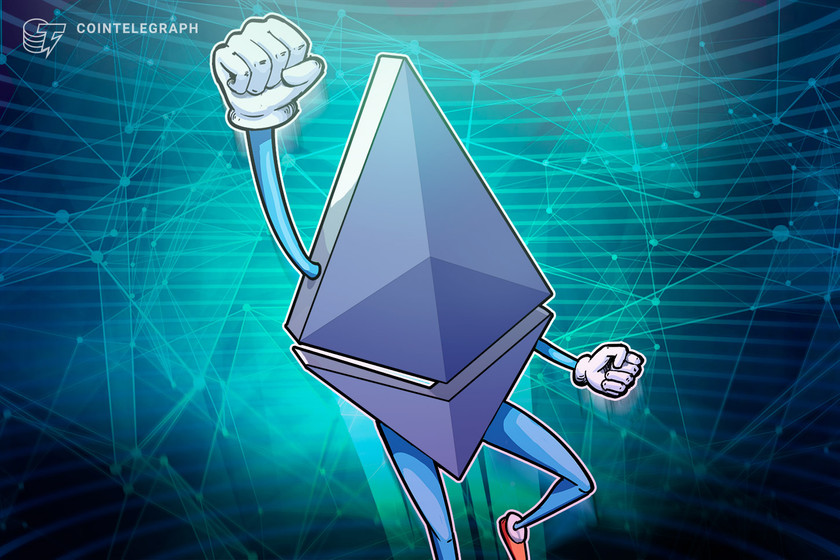Ethereum posts new highs as DeFi gas fees go through the roof

With Ethereum’s fees rocketing to new highs amid Ether’s rally into new price highs, the fees associated with using some complex DeFi protocols has increased above $1,000.
Ethereum’s gas fees are again spiking to record highs, rendering many decentralized finance protocols unusable for casual investors.
After increasing roughly 20% in the last 24 hours, average Ethereum transaction fees are now sitting at a record $17.67.
With many DeFi projects requiring the execution of complex smart contracts, there are reports fees associated with using protocols requiring complicated transactions now exceed $1,000. Amid the chaos, Twitter-user “Olive Allen” reported estimated gas fees of nearly $5,000 to accept a bid on Rarible.
Almost 5k is the price to accept a bid on @rariblecom now!! Is it because of ETH high gas fees⛽️ or some type of bug ?
Thoughts ? pic.twitter.com/tYoV1ilB85— Olive Allen (@IamOliveAllen) February 3, 2021
When Cointelegraph checked earlier today a single large transaction on Synthetix was estimated at above $1,100 – however the protocol is undergoing an upgrade which could affect estimates.
But even simple swaps using decentralized exchanges Uniswap and SushiSwap cost from $40 to $75.
Tried a $75 swap on sushi earlier. Gas fees were $74 on sushi swap and $37 on uniswap. Zero logical sense to even swap anything with fees like that.
— Kole Pfeiffer (@6pointd) February 4, 2021
Responding to the high fees, ConsensusRough podcast co-host ‘Checkmate’ warned DeFi users to consider the expense involved in executing smart contracts before investing.
He shared the screenshot of a user that purports to show estimated gas fees exceeding the price of Ether. (While this could have been faked, it’s broadly in line with similar reports).
Think very hard about whether you will be able to unwind your defi positions when the time comes to sell and gas fees are exponential.
Worth considering this risk because inability to exit is increasingly looking to be a reality. https://t.co/m9d09pUe0a
— _Checkmate ⚡checkonchain.com (@_Checkmatey_) February 3, 2021
Ethereum is not alone in suffering congestion, with Bitcoin’s average fees currently exceeding $14 too.
Despite the skyrocketing costs associated with utilizing the Bitcoin and Ethereum networks, traders appear vehemently bullish with Ether posting a new all-time of $1,700 at roughly 2 am UTC
Since breaking into new price highs on Feb. 2, Ether has gained roughly 14%. Bitcoin is also rallying, testing $38,000 after gaining 6% in the last 24 hours.
Ether’s record fees are highlighting the utility of second-layer scaling solutions ahead of Ethereum’s Eth2’s overhaul. Synthentix is currently in a staged migration to Optimistic roll ups to alleviate gas prices, while other platforms are exploring rival layer-two solutions such as xDai, or scalable layer-one networks such as Polkadot.
Ankr Network CEO and co-founder chandler Song recently described the crypto bull run as “expos[ing] a lot of vulnerabilities of the Ethereum network, which most DeFi projects are built upon.”
However, DeFi users may not have to wait until Eth2 to see a reduction in gas fees on the Ethereum mainnet, with developer Tim Beiko noting significant progress on the EIP-1559 testnet last month.
EIP-1559 was proposed by Vitalik Buterin and Eric Conner in 2019, recommending the introduction of a burn mechanism to reduce fee volatility. However, with the proposal reducing miners’ revenues to small tips sent alongside a burned base fee, EIP-1559 has been met with significant resistance from Ethereum’s mining community.
Grayscale recently speculated that EIP-1559 could create a “positive feedback loop” for Ethereum’s price should fee expenditures exceed the rate new supply’s creation.



